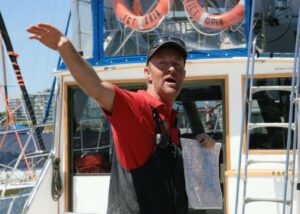Watching orcas in their natural habitat provides a unique experience, but spotting them relies on a network of fishing vessels, float planes and ferry boats.

JULY 2, 2016
VICTORIA, B.C. — Ian Roberts spends most days on the water leading whale watching tours, but that doesn’t diminish the thrill of the job — or the challenge. “Every day — every trip really — it starts with a search.”
As the SpringTide Whale Watching and Eco Tours captain steers away from Victoria Harbour, Roberts warns his passengers they have work to do.
“Keep your eyes peeled. You can see things before I do.”
It can be hard to know what you’re looking for at first. People shout and point at sticks, seals and even shorebirds, mistaking them for fins. Narrowing the search takes a co-ordinated effort by all the local operators. “We rely on each other,” Roberts says. They also get tips from a far-flung network of fishing vessels, float planes and ferry boats.
“That’s probably our most important source, a fisherman saying, ‘Hey I just saw a killer whale going past me.’ That gives us our direction.”
Once you know where you’re heading, the real adventure begins. As Roberts opens the throttle on his high-speed Zodiac, 11-year-old Kaelyn Garraway from Victoria throws her hands in the air and shouts “Faster.” She’s out for the day with her seven-year-old cousin Thalyn Paton, also from Victoria, and her grandfather Blake Neely, who is from Nanaimo, B.C.
It still takes close to an hour to cover the 100-plus kilometres between the boat and a pod of Transient killer whales looking for lunch near Galiano Island.
The expert hunters swim swiftly toward a pile of sunbathing seals. As the startled pinnipeds take to the water, the pod splits. Two remain close to the surface, while two others dive.
Roberts says orcas have the lung capacity to outlast seals underwater, and will often hold their attack until their prey comes up for air. Sure enough, the whales resurface in a ruckus of slapping tails and spraying surf: the celebration of a successful hunt.
It’s better than anything you’d see at an aquarium — and that, to Roberts, is the whole point of watching whales in their natural habitat.
“No one else is going to see this,” he says. This pod will move on, and others will arrive. Only those on board today will witness this display.
The ever-changing nature of the work is what keeps Roberts hooked.
“You start every single day, and you don’t know where you’re going to go,” he says. “The show is out there somewhere. You just have to go find it.”
Julia Kilpatrick was hosted by Tourism Victoria, which did not review or approve this story.
